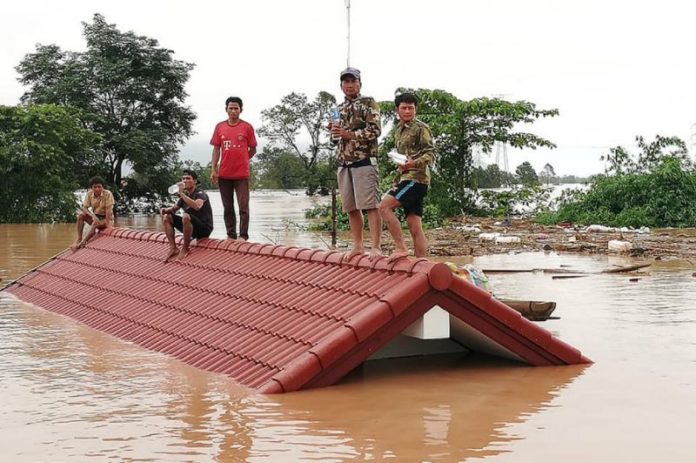ATTAPEU, Laos, July 25, 2018 (BSS/AFP) – Rescuers recovered 26 bodies and
hundreds remain missing after a dam collapse swamped several villages in
southern Laos, as survivors Wednesday questioned why they got little warning
of the deluge.
Two South Korean contractors said they reported damage at least a day
before parts of the Xe-Namnoy dam gave way Monday and unleashed a wall of
water.
A Thai consular official, Chana Miencharoen, at the scene of the relief
effort in Attapeu province told AFP that by Wednesday late afternoon 26
bodies had been recovered.
“Seventeen others are injured and in hospital,” he said, adding roof-level
floodwater was hampering rescue efforts in a remote area of the poor,
landlocked Southeast Asian country.
In an update on Wednesday afternoon state-run Laos News Agency said
hundreds of people remained unaccounted for, with at least 50 missing from
the village of Ban Mai alone.
Footage on Laos television showed people huddled on roofs awaiting rescue
as muddy water swirled menacingly just below them, with the army and local
volunteers leading the relief effort.
Questions began to emerge over the collapse, with some of the displaced
saying they were warned to evacuate homes only hours before disaster struck.
“It happened quickly, we had little time to prepare ourselves,” Joo Hinla,
68, from one of the worst-hit villages of Ban Hin Lath, told AFP from a
warehouse crammed with over 700 displaced people in a neighbouring province.
“All of the houses in my village are under water. Four of my family are
missing, we don’t know about their fate yet.” Hundreds of other displaced
people, including women, children and the elderly, sat on the floor nearby
surrounded by plastic bags crammed with meagre belongings.
– The damming of Laos –
Laos, poor but blessed with abundant natural resources, aims to become the
“Battery of Asia” allowing dozens of foreign-funded dam projects across its
network of rivers.
But fears over the environmental impact of the projects, which export most
of their electricity to neighbouring Thailand and China, go virtually
unvoiced inside the tightly controlled communist country.
Villagers across the country have been moved, some several times, to make
way for dams whose benefits are mainly enjoyed outside of the country,
campaigners say.
Once complete, around 90 percent of the electricity generated by the Xe-
Namnoy dam was destined for Thailand.
The remote flooded area is only accessible by helicopter and flat-bottomed
boats, with roads badly damaged or completely washed away.
Rescue officials in neighbouring Thailand were reportedly stuck at the
border because Laotians were sluggish in allowing access to the country.
South Korea was sending a relief team to the area, President Moon Jae-in’s
spokesman said Wednesday in Seoul.
“Although we are still determining the cause of the dam accident, our
government must actively take part in on-site relief efforts without delay as
our companies were involved in the construction of the dam,” Moon was quoted
as saying.
– Questions over warning – Two South Korean companies involved in the $1.2
billion project said damage was reported a day before the dam collapsed
following heavy monsoon rain.
SK Engineering & Construction said it discovered that the upper part of the
structure had washed away at around 9:00 pm on Sunday.
“We immediately alerted the authorities and began evacuating villagers
downstream,” it said in a statement.
Repair work was hampered by rain which had damaged roads, it said, and
early on Monday water was discharged from the Xe-Namnoy dam — one of the two
main dams in the project — to try to relieve pressure on the auxiliary
structure.
The government was warned about further damage to the dam at around noon,
prompting an official evacuation order for villagers downstream, and the
structure collapsed a few hours later, it said.
Dam operator Korea Western Power Co. said one of the auxiliary dams —
“Saddle D” — broke under heavy rain.
But according to a timeline the firm provided in a report to a South
Korean lawmaker and obtained by AFP, it said “11 centimetres of subsidence
was found at the centre of the dam ” as early as Friday.
Emergency repair equipment could not be used as the subsidence worsened.
“It remains unclear what caused the dam to subside in some places and
develop cracks,” a Korea Western Power spokesman told AFP.
The 410 megawatt capacity plant was supposed to start commercial operations
by 2019.
The project consists of a series of dams over the Houay Makchanh, the Xe-
Namnoy and the Xe-Pian rivers.



